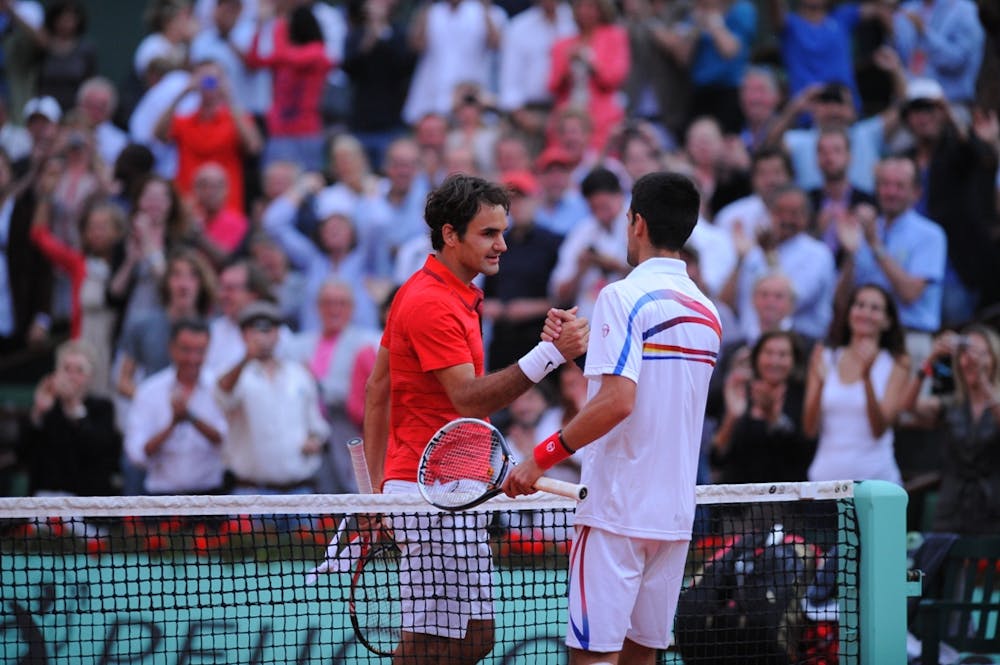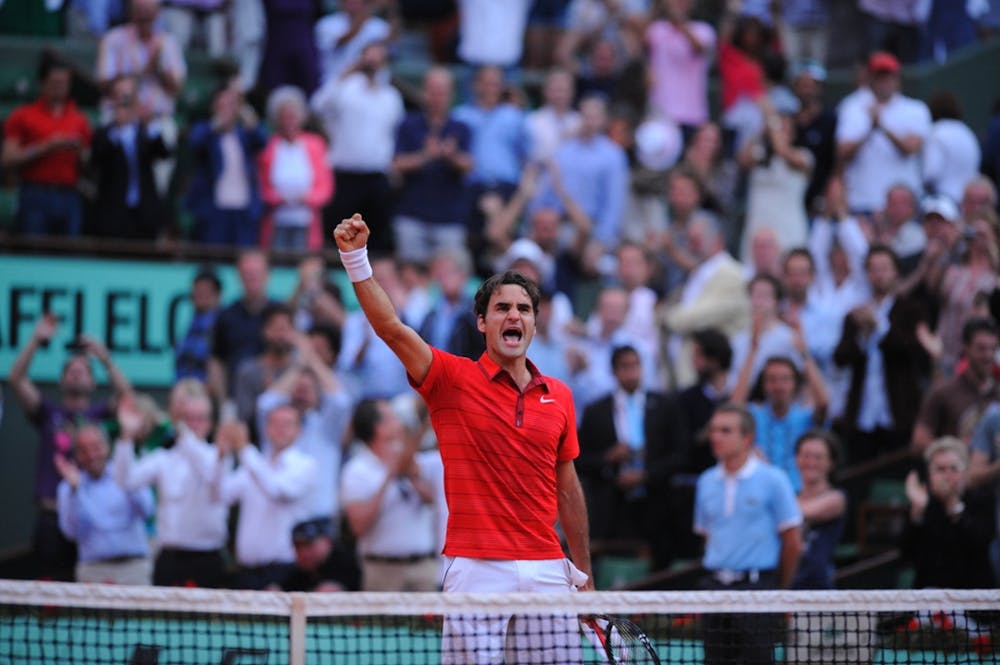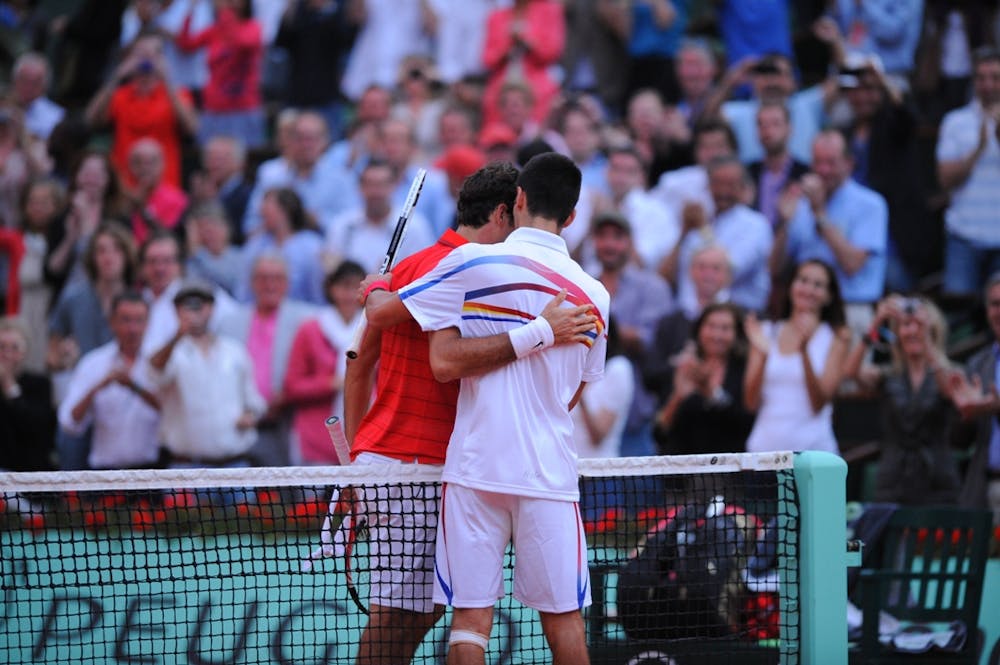Court Philippe-Chatrier in the rapidly-fading light, history at the ready.
The crowded tribunes are supercharged, yet eerily silent, as Roger Federer prepares to serve in a fourth-set tiebreaker against an undaunted Novak Djokovic.
A decade ago, the Swiss channelled the electricity of the Parisian crowd to stun the Serb and reach the final

Court Philippe-Chatrier in the rapidly-fading light, history at the ready.
The crowded tribunes are supercharged, yet eerily silent, as Roger Federer prepares to serve in a fourth-set tiebreaker against an undaunted Novak Djokovic.
2011 was defined by Djokovic’s dominance at the start and it would be again at the finish, but on this day in early June, spring bloomed for Federer as he swooped in to end the Serb’s 43-match winning streak and - for a brief moment in time - impede his steady push to to become the dominant figure in men’s tennis.
“Well, it's been 10 years, quite a long time ago,” Djokovic recalled last week in Paris. “But, yeah, I remember of course losing that match. I lost that streak of, what, 43 matches? It was an incredible run for me that ended [when I lost] to Roger in the semis. But he played a fantastic match.”
It was the one that got away from Djokovic, during a year in which very little did.
Fresh off an emotional Davis Cup triumph in 2010, Djokovic would claim three Grand Slam titles in 2011 and climb to No.1 in the rankings for the first time on July 4, after toppling Rafael Nadal in the Wimbledon final.
On the road to Roland-Garros, he had swiftly dispatched the 'King of Clay' two times, in the Madrid final and the Rome final. without dropping a set, to emerge as a viable Roland-Garros contender.
But in Paris, with Nadal in hot pursuit of a record-tying sixth title, Federer had other ideas about who would challenge him in the final. A 16-time Grand Slam champion at the time, the Swiss was not accustomed to the underdog role, but he played it to perfection on this occasion.
“All the matches with the big players have a special feel,” Paul Annacone, Federer’s coach at the time, told rolandgarros.com. “Since Novak had not lost yet it was especially daunting, but a great challenge and Roger was really excited about playing the match - those moments are special, even for the greats.”
The collaborative tension between Djokovic and Federer - well-documented and exacerbated that year by Djokovic’s three consecutive victories over the Swiss at the Australian Open, Dubai and Indian Wells, certainly heightened the intensity of the contest, for the players and the legions of fans supporting both.

"There is always a different feel to Novak's rivalry with Federer compared to his rivalry with Nadal," Serbian journalist Sasa Ozmo said. "I always felt, and this is my perception, that with Roger, it gets a bit more personal."
The match played out as a high-intensity seesaw battle. Federer edged ahead two sets to one but as darkness crept in Djokovic served for the fourth set, leading 5-4.
It wasn’t to be. He would falter and Federer, sensing the opportunity to take his place in the final for the fifth time, struck the final high notes of his symphonic charge to victory. The crowd, enraptured, elevated the intensity of the moment.
“Yeah, it was a good crowd,” Federer recalls. “Definitely high quality. It was always going to take a great performance to beat Novak at that moment because he was on the run. Was up a break fourth set, I believe, with the light fading. I think there was a lot riding on that as well.
“I count myself very lucky that I had the chance to play so many cool matches in basically all the big stadiums around the world for many years. That was definitely one of them as well.”

Annacone remembers the match as the ultimate challenge for Federer.
“I think he was aware of the situation clearly,” he said of the prospect of facing the hottest player on the planet. “He’d been playing very well and loves Paris - and Paris loves him. That being said he has always been very professional and ready for the task at hand. Great athletes like challenges and Novak was and is a tremendous challenge. It was a very high level of tennis and the energy in the stadium matched it.”
Ozmo remembers that the palpable disappointment from the Djokovic fan base was not prolonged.
"After Roland-Garros, it was the first time, but not the last time that [Djokovic] would bounce back from a devastating defeat in Paris to win Wimbledon,” he said.
Djokovic remembers the epic battle of wills, the approaching dusk, and a Federer that was just too good on that day.
“It was, of course, disappointing to lose, but at the same time I just had to congratulate him because he just played a better match,” reflects the Serb. “I think until really the last shot, we were kind of pushing each other. I think it was really difficult to see, as I can remember, because there were no lights, obviously no roof at that time, and it was already very dark. I think it was past 9:30 in the evening.
“It was one of the epic matches that of course you remember for a long time.”